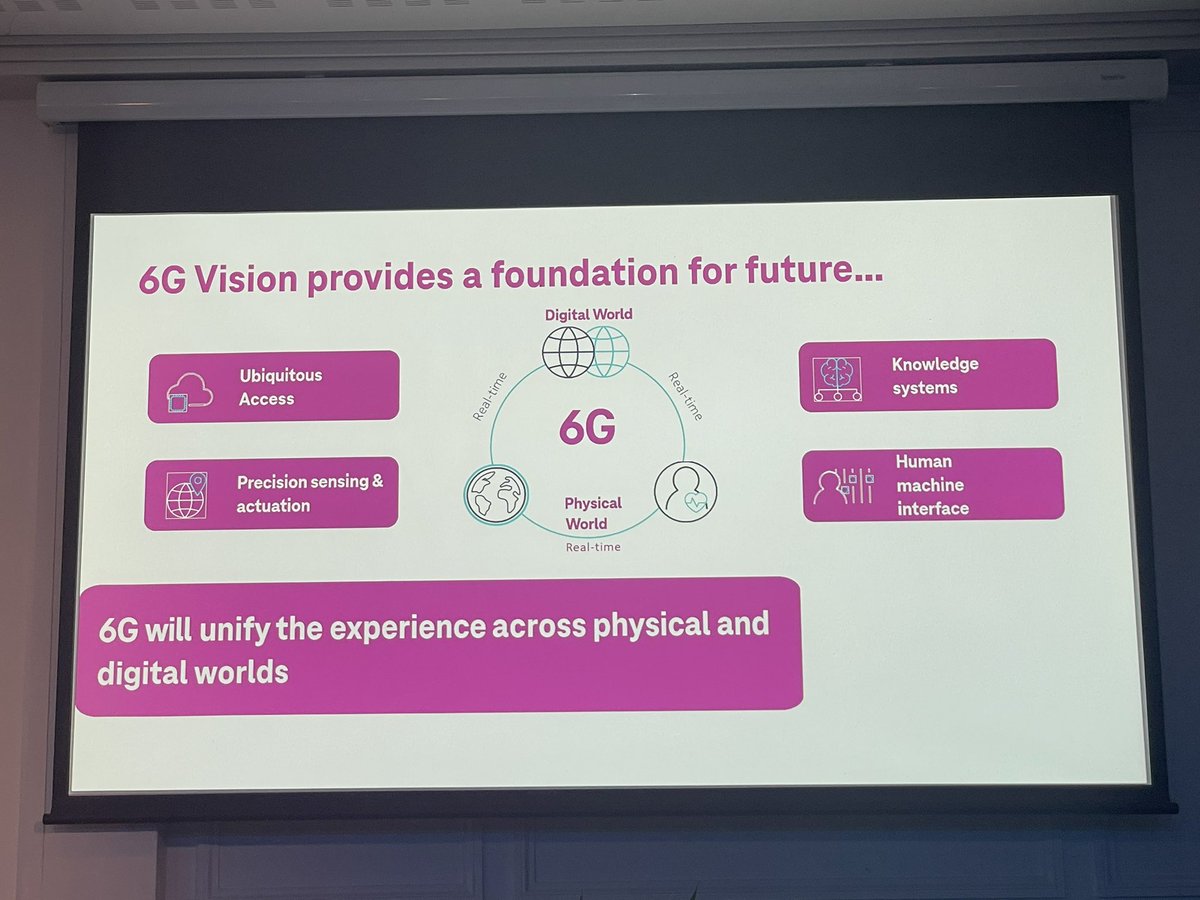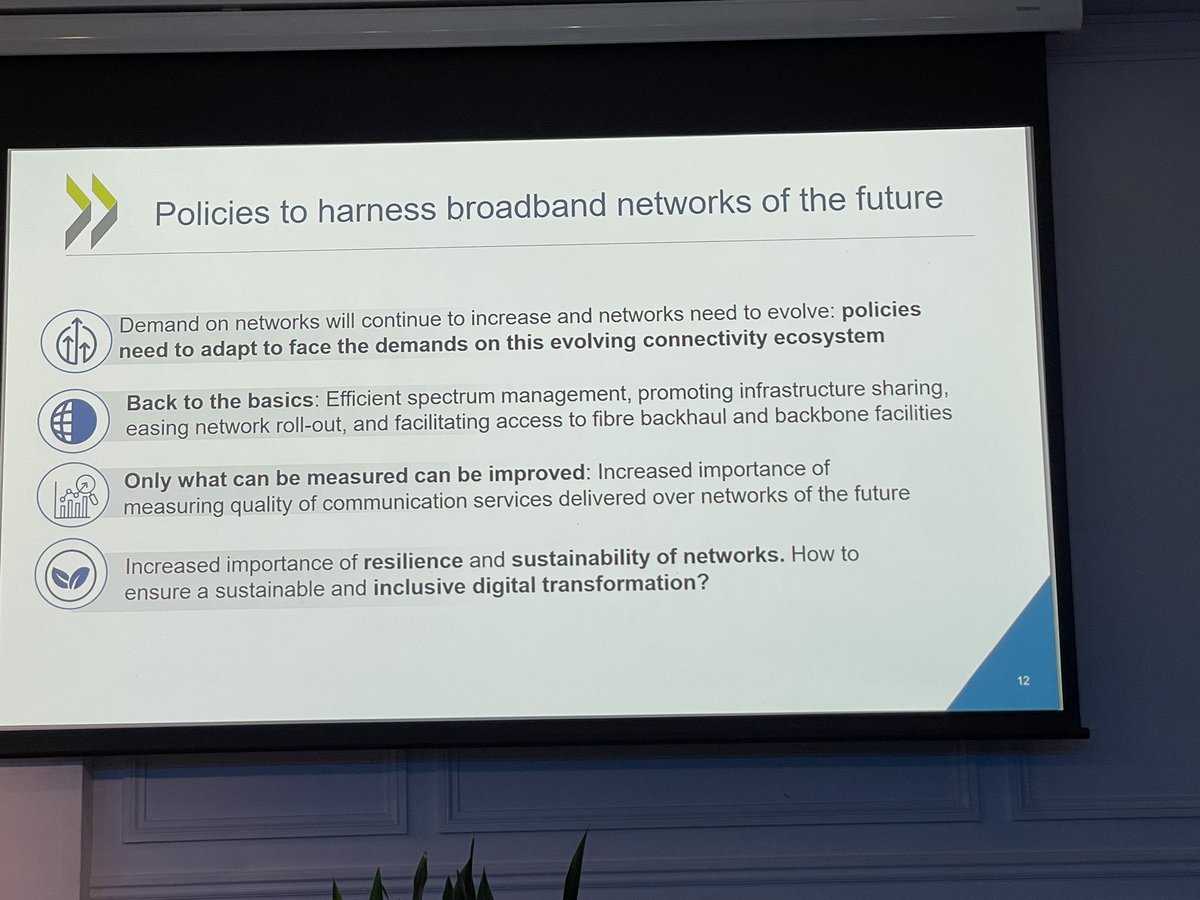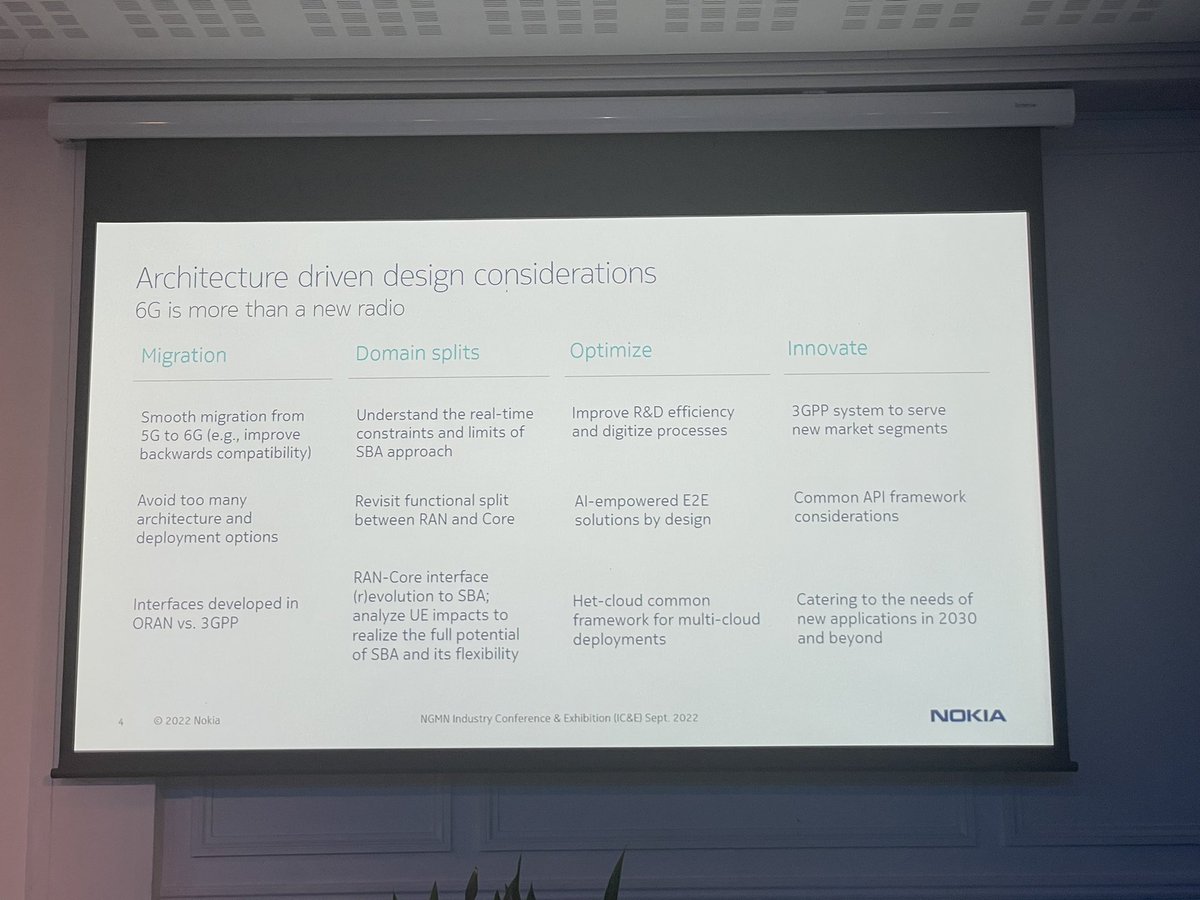
No #5G roaming for @VodafoneUK subs in France
#NGMNICE22 venue gets two bars of 4G signal, but at least the WiFi is decently fast at about 60Mbps & 7ms latency (even through a VPN)
#NGMNICE22 venue gets two bars of 4G signal, but at least the WiFi is decently fast at about 60Mbps & 7ms latency (even through a VPN)
Interesting focus on #6G “societal requirements & use cases”
Hope to see things like “multiple network owner types & models” & “needs to be indoor-primary”
… and not too much blather about sci-fi visions of a sensory/olfactory metaverse
… & no “flatrate data is bad” rhetoric
Hope to see things like “multiple network owner types & models” & “needs to be indoor-primary”
… and not too much blather about sci-fi visions of a sensory/olfactory metaverse
… & no “flatrate data is bad” rhetoric
Honest talk about industry challenges (inc geopolitical & economic) by @ArashAshouriha of @deutschetelekom 

#OpenRAN is a "huge journey" and "painful process"
Needs lots of efforts to commercialise. DT recognises 6 strands:
- O-RAN town deployed on a live network
- SMO & automation
- Skills (hugely needed)
- New operating model, eg inhouse SI?
- Foster ecosystem
- Vendor selection
Needs lots of efforts to commercialise. DT recognises 6 strands:
- O-RAN town deployed on a live network
- SMO & automation
- Skills (hugely needed)
- New operating model, eg inhouse SI?
- Foster ecosystem
- Vendor selection
Major pitch on green networks & #netzero
Scope 3 is tricky
“Some operators are more aggressive and aiming for 2035. But nobody knows how to do that”
Scope 3 is tricky
“Some operators are more aggressive and aiming for 2035. But nobody knows how to do that”

Hmm. Unconvinced by “dynamic digital worlds” as key use-case for 6G
AI & sensing makes more sense
I thought Massive IoT was a 4G/5G thing & it’s still not really here (at least not with cellular)
AI & sensing makes more sense
I thought Massive IoT was a 4G/5G thing & it’s still not really here (at least not with cellular)

“Ubiquitous access” as a key #6G vision, apparently
Let’s see how long before the word “indoors” is mentioned today…
Let’s see how long before the word “indoors” is mentioned today…

Now @orange up at #ngmnice22
Good slide on industry moving from vertical silos to layers, with telcos outsourcing towers & leveraging (or becoming) platforms

Good slide on industry moving from vertical silos to layers, with telcos outsourcing towers & leveraging (or becoming) platforms


Interesting (& wise) words from Orange speaker about on-demand services and APIs
"Whether we are the platform, or whether we are part of someone else's"
[picture on the slide shows an advert from Twilio]
References the CAMARA project - needs use-cases as well as tech.
"Whether we are the platform, or whether we are part of someone else's"
[picture on the slide shows an advert from Twilio]
References the CAMARA project - needs use-cases as well as tech.
Talks about the Pikeo experimental 5G SA Open RAN network they are using as a testbed at Orange
"Cloud-native functions are quite mature. Open RAN less so"
Identified some security aspects to focus on
"Cloud-native functions are quite mature. Open RAN less so"
Identified some security aspects to focus on
"Telco cloud is a nightmare" - Leboucher is not mincing words!
Still got too many verticals for core, signalling etc
"It's a commodity. We won't differentiate on telco cloud. But we need it to work. And to be simple. This is a key challenge"
Still got too many verticals for core, signalling etc
"It's a commodity. We won't differentiate on telco cloud. But we need it to work. And to be simple. This is a key challenge"
Sets out 4 challenges for NGMN on cloud-native & disaggregated networks
- limit fragmentation
- more automation
- appropriate security tools
- share best-practice on integration between operators eg in OpenRAN
- limit fragmentation
- more automation
- appropriate security tools
- share best-practice on integration between operators eg in OpenRAN

Next up a panel on disaggregation moderated by @Gabeuk with speakers from @TELUS @bt_uk @IBM & @googlecloud 

Listening to @GedeonIbrahim CTO of @TELUS - absolutely awesome presentation (and very funny video clip & anecdotes)
Talking about the realities of automation - what to automate first & overall philosophy of how the automated bits align with each other
Talking about the realities of automation - what to automate first & overall philosophy of how the automated bits align with each other
Now @bt_uk Howard Watson
Usual big pitch on “converged” fixed + mobile network
Not clear exactly what is converged & how, beyond the fibre, IP & compute infra, although refs telco cloud (& lots of legacy bits)
Also mentions WiFi, small cells, edge & neutral host

Usual big pitch on “converged” fixed + mobile network
Not clear exactly what is converged & how, beyond the fibre, IP & compute infra, although refs telco cloud (& lots of legacy bits)
Also mentions WiFi, small cells, edge & neutral host


Really important slide about the realities of #openran in a brownfield network which still has old 3G / 2G to interwork with
Lots of multivendor integration & interop
Also mentions security
Lots of multivendor integration & interop
Also mentions security

Now @IBM Andrew Coward at #NGMNICE22
Interesting comment that network automation is happening slower than compute automation
Edge slide is interesting. Sees most I4.0 stuff on-prem, with some gaming, video analytics & CDN at the network edge.

Interesting comment that network automation is happening slower than compute automation
Edge slide is interesting. Sees most I4.0 stuff on-prem, with some gaming, video analytics & CDN at the network edge.


Final speaker in this session is from @googlecloud
Talks about 10 apps that Google has successfully globalised
(Oddly doesn’t list messaging & RCS. What an oversight. 🤣)
Talks about 10 apps that Google has successfully globalised
(Oddly doesn’t list messaging & RCS. What an oversight. 🤣)

Very candid slide about challenges of original VNFs & now being seen for containers as well
This event sees like a serious reality-check on telco cloud. Automation mentioned by everyone so far
This event sees like a serious reality-check on telco cloud. Automation mentioned by everyone so far

Next session is on disaggregation - led by @lightcounting Stephane Teral
More focus in session intro on network disag - with observations on cell site routers & Open RAN
Followed by @1und1 talking about its work with @RakutenSymphony



More focus in session intro on network disag - with observations on cell site routers & Open RAN
Followed by @1und1 talking about its work with @RakutenSymphony




@1und1 is doing 24 edge data centres with CUs + 500+ local DCs with DUs (max distance 10km from radio) 



Next up is @ngvoice talking about how smaller vendors & innovators can work with MNOs
(wonder if they'll mention how most telcos' procurement, payment and supplier-management systems are very bad at dealing with small companies. Onboarding, invoicing etc is usually a nightmare)
(wonder if they'll mention how most telcos' procurement, payment and supplier-management systems are very bad at dealing with small companies. Onboarding, invoicing etc is usually a nightmare)
Cool slide on the resource needs of containerised / microservices network functions vs traditional monolithic platforms
Here, vIMS
Here, vIMS

“Procure differently” - spot on, @ngvoice
It amazes me that telcos talk so emphatically about platforms, APIs & developers, when they’re so badly set up for commercial relationships with small companies & individuals
It amazes me that telcos talk so emphatically about platforms, APIs & developers, when they’re so badly set up for commercial relationships with small companies & individuals

Interesting slide on disagg - not just #openran - from @pldt @LiveSmart from Philippines
Lot more interest I’m seeing in transport & fibre domains
Lot more interest I’m seeing in transport & fibre domains

Now @JuniperNetworks talking about CRAN, DRAN & how to treat cell site routers
Notes that many networks end up hybrids of site types, reflecting fibre available, real estate etc

Notes that many networks end up hybrids of site types, reflecting fibre available, real estate etc


Looking forward to this 10-speaker session on #6G and panel moderated by @cmendler
Kicked off by a speaker from @OECD . Not convinced by the 1GB/second claim for autonomous vehicles…
Curious to see how long before we get before mentions of “indoors” or “network sharin
Kicked off by a speaker from @OECD . Not convinced by the 1GB/second claim for autonomous vehicles…
Curious to see how long before we get before mentions of “indoors” or “network sharin

Some pragmatic comments here from OECD @WeberVere about link to fibre & WiFi 



Not quite sure what “extreme low energy” means (it’s a @NTTDocomoNews slide), but some of the concepts I’ve seen for 6G are going to struggle with it - including the THz and mmWave mentioned in the next slide 



Now up, a @VodafoneGroup futurist talking about 6G applications & use-cases vs 5G ones
Starts with usual caveats about forecasts being difficult & often wrong…
Curious to see how @NGMN_Alliance 6G use case categorisation differs from mine / Charlotte’s in recent 6G report
Starts with usual caveats about forecasts being difficult & often wrong…
Curious to see how @NGMN_Alliance 6G use case categorisation differs from mine / Charlotte’s in recent 6G report

Some similarities
But misses core opportunities of better FWA and MBB
Lots of very generic things like healthcare (1000s of separate applications, most well suited to multiple network types)
But misses core opportunities of better FWA and MBB
Lots of very generic things like healthcare (1000s of separate applications, most well suited to multiple network types)

I like this categorisation of disruptive technologies as often being *less* functionality but *more* convenient
- implies need for openness (APIs) and software
- implies need for openness (APIs) and software

Good - VF speaker mentions lots of use-cases will be indoors
May be delivered over WiFi (or satellite).
“Not just a 3GPP connectivity layer”
May be delivered over WiFi (or satellite).
“Not just a 3GPP connectivity layer”
Presentation from @Bell aligning 6G more with community & wider societal considerations
Good to see the words “feasible and deliverable” appear
Points out trade offs between “extreme this & that” vs “extreme low energy”

Good to see the words “feasible and deliverable” appear
Points out trade offs between “extreme this & that” vs “extreme low energy”


There’s a lot going on in these slides from @chinamobile
Good point about link/overlap with 5G Advanced
Also the x-disciplinary research models between different tech domains



Good point about link/overlap with 5G Advanced
Also the x-disciplinary research models between different tech domains




China Mobile is the first speaker to stress desire for a unified global 6G standard
Notes there are 27 national initiatives currently
Notes there are 27 national initiatives currently

First mention of the “upper mid” band 7-24GHz from SKT
I suspect many in mobile industry underplaying this (and overplaying THz) to avoid muddying the (flawed) messaging on 6GHz
I suspect many in mobile industry underplaying this (and overplaying THz) to avoid muddying the (flawed) messaging on 6GHz

I’ve seen the word “quantum” crop up in 3 presentations so far
Mostly aimed at security implications - either quantum-safe crypto or QKD
Also: Korea aiming for 2026 “pre-6G trial”
Mostly aimed at security implications - either quantum-safe crypto or QKD
Also: Korea aiming for 2026 “pre-6G trial”

This is cool - @orange + @Lenovo demo monitoring both hardware & software energy consumption
Here used for a 5G SA private network with an indoor small cell
Here used for a 5G SA private network with an indoor small cell

Now @nokia with lessons / recommendations for #6G
Some are right, some are wrong IMO
The idea that ITU should have just one candidate for 6G is utterly monopolistic & risks a dangerous monoculture. Attempted 3GPP capture which needs robust pushback

Some are right, some are wrong IMO
The idea that ITU should have just one candidate for 6G is utterly monopolistic & risks a dangerous monoculture. Attempted 3GPP capture which needs robust pushback


“Need to think environment-first”
Mobile networks - 93% of energy are in operations
I agree that traffic and energy use should be decoupled
Mobile networks - 93% of energy are in operations
I agree that traffic and energy use should be decoupled

Big push by Nokia for a single global standard for 6G
I think that may be unrealistic
Better to acknowledge now that 6G *may* be fragmented & design for APIs to allow gateways and interworking
We can’t predict 8 years of geopolitics, so we need to have contingency plans
I think that may be unrealistic
Better to acknowledge now that 6G *may* be fragmented & design for APIs to allow gateways and interworking
We can’t predict 8 years of geopolitics, so we need to have contingency plans
Now @Huawei talking about 5G to 6G migration
Notes patchiness & variation in 5G deployments & experiences
Some interesting stats on industrial vertical use of 5G in China here too

Notes patchiness & variation in 5G deployments & experiences
Some interesting stats on industrial vertical use of 5G in China here too


Good to see refs to sensing & positioning even for 5G advanced (Huawei calls it 5.5G)
Talking about 10Gbps downlink everywhere
(Mentions upper 6GHz band, unsurprisingly)
Talking about 10Gbps downlink everywhere
(Mentions upper 6GHz band, unsurprisingly)

Sees 5G problematic for high speed uplink
Oddly Huawei doesn’t mention that localised uplink-centric networks can be easily created with private spectrum allocations
Enterprises can create custom up/down mix depending on local requirements
Much harder for MNOs to do

Oddly Huawei doesn’t mention that localised uplink-centric networks can be easily created with private spectrum allocations
Enterprises can create custom up/down mix depending on local requirements
Much harder for MNOs to do


I’ve been calling #6G “AI native” for a while. Good to see it starting to stick
Mention of non-terrestrial / satellite is notable. Curious to see how Huawei will play in that market
Mention of non-terrestrial / satellite is notable. Curious to see how Huawei will play in that market

An actual industrial user of networks is next! @TRUMPF_News is a midsize producer of machine tools for manufacturing
(I’ve seen them present at previous 5G events including at a @LS_telcom conference)
(I’ve seen them present at previous 5G events including at a @LS_telcom conference)

Last speaker @6gLife
Oh dear. Metaverse. Which is obviously going to be WiFi (or USB) primary, not 6G
Oh dear. Metaverse. Which is obviously going to be WiFi (or USB) primary, not 6G

I don’t think I’ve heard any references to private networks today. Given that @NGMN_Alliance is an MNO-member association I guess that’s unsurprising but I would have expected a bit more realism
By 2030 there will probably be 100K+ private network. MNOs will be a tiny minority
By 2030 there will probably be 100K+ private network. MNOs will be a tiny minority
Love the ?? for #wifi7 in this chart
It’s here next year. By 2030 and 6G timeframe, it will be WiFi9+ I expect
It’s here next year. By 2030 and 6G timeframe, it will be WiFi9+ I expect

This is the daftest slide today “in-network computing”
Apparently it’ll allow telcos to “kill” the “OTTs” in the 6G era
The speaker is the Deutsche Telekom Chair of Comms Networks at @tudresden_de btw
Apparently it’ll allow telcos to “kill” the “OTTs” in the 6G era
The speaker is the Deutsche Telekom Chair of Comms Networks at @tudresden_de btw

Asked the panel what they expect when 100K private networks (and their vendors) feed their requirements & expectations into 6G pathway
Not sure if they haven't thought about, or I phrased it badly, but got diverted to discussion about vertical groups like 5GACIA & 5GAA
Not sure if they haven't thought about, or I phrased it badly, but got diverted to discussion about vertical groups like 5GACIA & 5GAA
Completely missed the *functional* aspects of more private networks than public networks
eg coordinating 1000's of separate networks per sq km, not 100000s of devices, or new ways of network-sharing with dynamic mix of uplink/downlink, or indoor-centric networks
eg coordinating 1000's of separate networks per sq km, not 100000s of devices, or new ways of network-sharing with dynamic mix of uplink/downlink, or indoor-centric networks
• • •
Missing some Tweet in this thread? You can try to
force a refresh



















